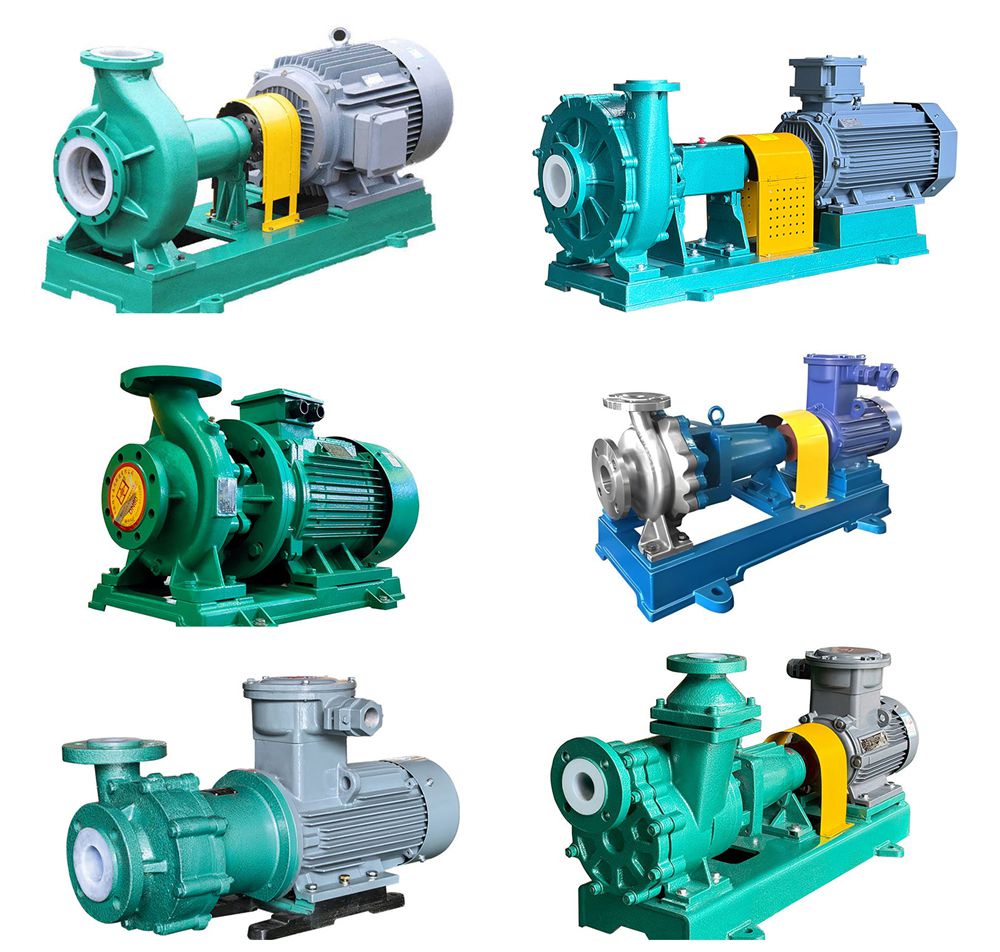Acid-resistant pumps are widely used in chemical production processes, typically for conveying acidic and alkaline liquids, with acidic liquids being the predominant type. Due to the highly corrosive nature of acidic media, many conventional acid-resistant pump materials are unsuitable for handling such liquids. Selecting the appropriate acid-resistant pump requires a comprehensive evaluation based on specific operating conditions, such as concentration, temperature, and pressure. Below, we introduce six types of acid-resistant pumps and their selection methods. Please continue reading this article.

In chemical production, the concentration of commonly used industrial hydrochloric acid is generally 38%, making it highly corrosive. Therefore, pumps conveying hydrochloric acid require flow-through components made of corrosion-resistant plastic. Considering equipment lifespan, operational stability, and overall cost-effectiveness, we recommend FZB fluoroalloy centrifugal pumps or CYQ magnetic drive pumps. These pump types not only excel in material corrosion resistance but also offer significant advantages in operational efficiency, maintenance costs, and reliability, better meeting the economic and long-term requirements of hydrochloric acid conveying applications.
The selection of pumps for conveying sulfuric acid depends on its concentration. Pumps are primarily classified into two categories: dilute sulfuric acid pumps and concentrated sulfuric acid pumps. For dilute sulfuric acid, a wider range of materials are available, including engineering plastics, ceramics, F46 (fluoroethylene propylene), or F26 (fluororubber). Concentrated sulfuric acid, on the other hand, is highly corrosive and oxidizing, and fluoroplastics (such as CYF Series Fluoroplastic Centrifugal Pump) are generally required. Due to the high density of concentrated sulfuric acid, special attention should be paid to the power rating when selecting a pump motor. It is recommended to multiply the shaft power by 1.84 to avoid motor overload.
Hydrofluoric acid (HF) is extremely corrosive and can severely attack most metals and ceramics. Therefore, when transporting HF, it is strongly recommended to use a fluoroplastic magnetic drive pump to ensure equipment safety and durability. It is particularly important to replace all ceramic components within the pump with HF-resistant materials (such as polytetrafluoroethylene (PTFE), modified polypropylene, or carbon graphite) to prevent corrosion, leakage, and equipment failure.
When transporting nitric acid, it is recommended to use a highly corrosion-resistant fluoroplastic magnetic drive pump. Furthermore, the rubber seals within the pump body should be replaced with polytetrafluoroethylene (PTFE) to enhance sealing safety and service life.
Acetic acid is a highly corrosive organic acid that is corrosive to many metals. Ordinary carbon steel will corrode severely in acetic acid at all concentrations and temperatures and is therefore unsuitable for use in this medium. Stainless steel, particularly molybdenum-containing 316 stainless steel, has excellent acetic acid resistance and can be used in high-temperature and dilute acetic acid vapor environments. For demanding applications involving high temperatures, high concentrations of acetic acid, or other corrosive media, high-alloy stainless steel or fluoroplastic magnetic drive pumps (such as the CQB magnetic drive pump) are recommended.
In chloride ion environments such as sodium chloride solutions, seawater, and brackish water, the uniform corrosion rate of ordinary steel is relatively low, but coatings are still generally required for protection. Various types of stainless steel also exhibit low overall corrosion rates in such media, but are susceptible to localized corrosion (such as pitting and crevice corrosion) caused by chloride ions. Although 316 stainless steel offers excellent resistance to chloride ion corrosion, it is relatively expensive. Considering both cost and reliability, fluoroplastic centrifugal pumps (such as IHF chemical centrifugal pumps) are recommended. These materials effectively resist chloride ion corrosion, offer a long service life, and offer a low overall cost.
In summary, the selection of industrial acid-resistant pumps requires comprehensive consideration of the media composition, concentration, temperature, and specific operating conditions. The correct choice of pump material and structural type is directly related to the safety, stability, and service life of the production system. When operating in complex conditions such as highly corrosive media, high temperatures, high concentrations, or the presence of solid particles, professional selection experience and technical judgment are essential.
If you have any questions regarding pump selection or actual application, please feel free to contact our technical team. We can provide you with targeted selection suggestions and professional technical support.
Our hours
Mon 11/21 - Wed 11/23: 9 AM - 8 PM
Thu 11/24: closed - Happy Thanksgiving!
Fri 11/25: 8 AM - 10 PM
Sat 11/26 - Sun 11/27: 10 AM - 9 PM
(all hours are Eastern Time)